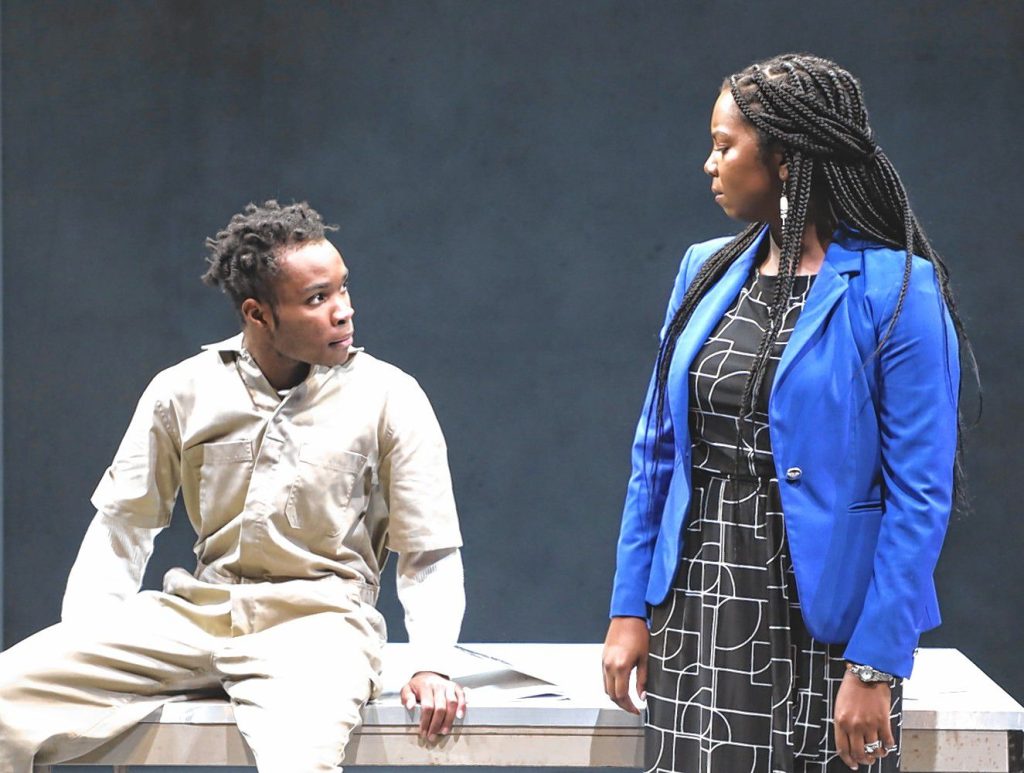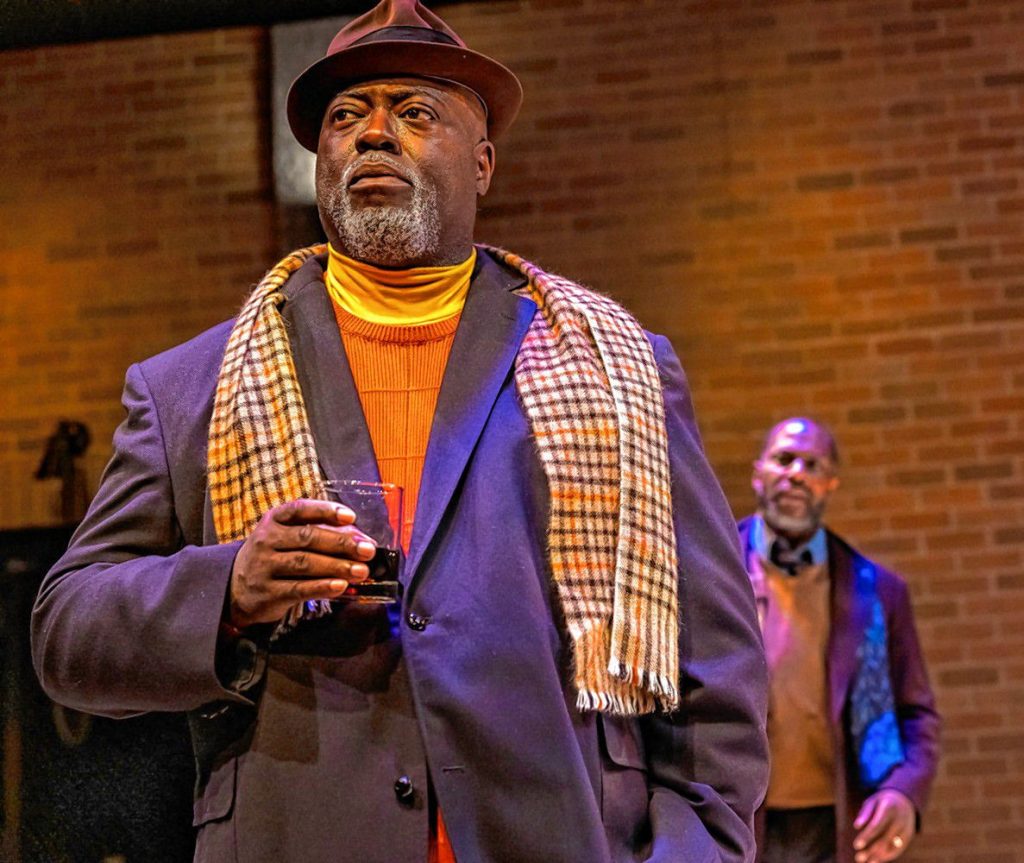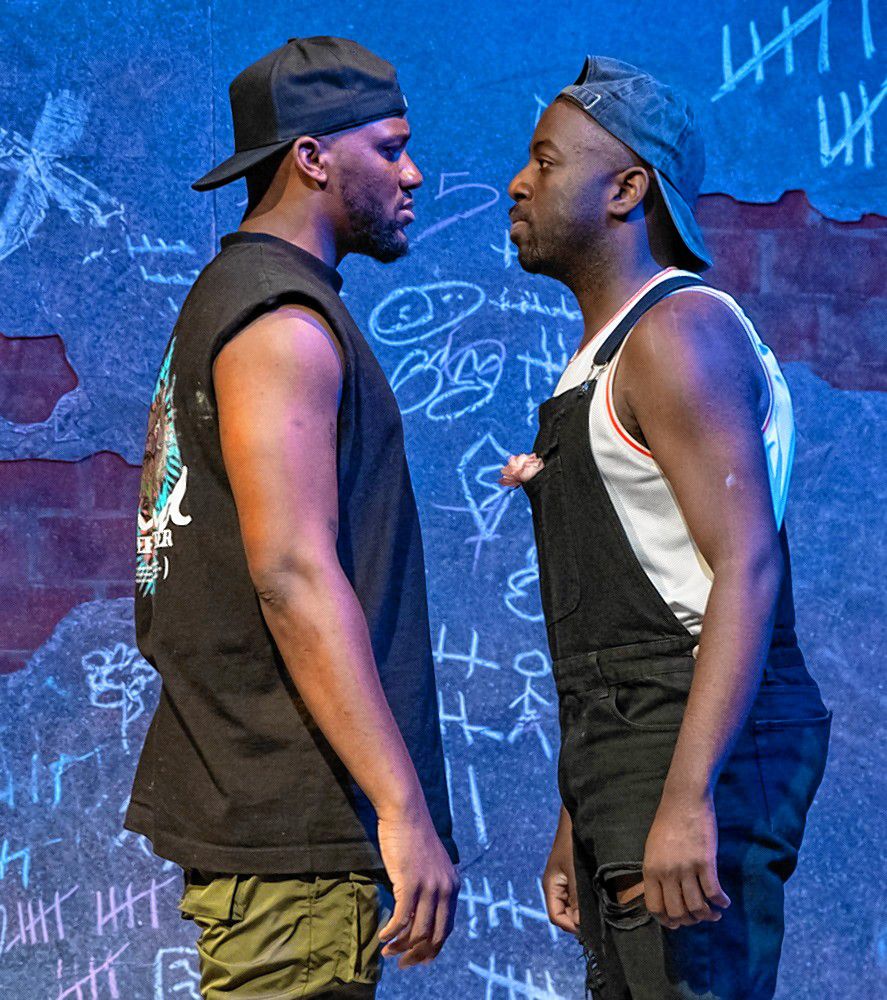2020’s Summer of Rage following the murder of George Floyd — another “last straw” in response to police killings of Black men — gave rise to much soul-searching in many areas of American society, including the theater community. Some of the fruits were on view this summer.
Most of the theaters in this area already have a record of inclusion, starting with the frequent practice of “color-blind” and “color-conscious” casting. But this crisis of conscience produced a new awareness and urgency. This summer, four of the major summer theaters in Western Mass mounted new plays by playwrights of color, centered on Black characters and a variety of social issues.
At Barrington Stage Company, the issue was racial disparities in education; at Berkshire Theatre Group, “code switching” and inequities in the penal system; at Shakespeare & Company, Black entrepreneurship within a story of male-bonding; and at Chester Theatre Company, the very evils that sent people pouring into the streets two summers ago. (Two other Berkshire theaters also staged plays focused on people of color. WAM Theatre’s two-hander “Bright Half Life” looked at a mixed-race lesbian relationship, and Williamstown Theatre Festival’s comedy “Man of God” found four Korean-American girls staring down the male gaze.)
While all four were thoughtful and heartfelt, they succeeded, artistically and/or thematically, in varying degrees. I reviewed them in my Stagestruck column on Valley Advocate.com. Here’s a wrap-up.
Berkshire Theatre Group premiered Tara Wilson Noth’s “B.R.O.K.E.N code B.I.R.D switching,” its unusual title signaling the stitching together of two separate themes. One of the play’s “broken birds” is Deshawn, a young Black man accused of a murder he swears he didn’t commit. His lawyer is Olivia, a Black woman married to a white man. She’s also been “broken” by grief after the crib death of her baby.
I found the play fascinating and frustrating — an engaging idea imperfectly worked out. The code-switching theme is expressed obliquely at best, and Deshawn isn’t trapped by the system so much as by his own misplaced notions of manhood and loyalty. The man who rescues Olivia from her well of despair is a kind of shaman-figure, a metaphor of wisdom and healing who nonetheless is the most interesting character in the piece.
Director Kimille Howard’s largely strong cast was not well served by a script that depends on sudden plot turns and clichéd language, nor by the lead player, DeAnna Supplee, who struggled to animate her stilted dialogue. The production showcased an intriguing script in need of further thought and development.
Another world premiere was May Treuhaft-Ali’s “ABCD” at Barrington Stage Company, which also this summer mounted Nilo Cruz’s “Anna in the Tropics,” set in a cigar-rolling factory in Tampa’s Little Havana, and the Fats Waller jukebox musical “Ain’t Misbehavin’.” “ABCD” is set in two high schools that are in the same town, but worlds apart. One serves a low-income, largely Black and Latinx population, the other boasts an elite white and Asian-American student body.
The two schools have one thing in common: the pressure to succeed. One is threatened with closure if it can’t improve its standardized test scores; in the other the students compete for admission to the top colleges. In both, the response is to cheat.
Based on two actual incidents, the script is sometimes awkwardly plot-driven, but Treuhaft-Ali’s sense of character and ear for youthspeak, along with Daniel J. Bryant’s savvy production and across-the-board excellent cast, made it a summer must-see.
The most eagerly awaited show on my calendar was also the most disappointing. “Hymn,” at Shakespeare & Company, was written by the English playwright Lolita Chakrabarti, author of “Red Velvet,” about the first Black actor to play Othello, which S&Co previously produced. This one takes place in Detroit, where two middle-aged Black men, Gil and Benny, meet at the funeral of Gil’s father and Benny reveals he’s the dead man’s son too. The play follows the two men’s growing connection over the course of a year, emphasizing issues of class and family more than race.
My problem with the show was that the plot has too many implausible Huh? moments and Regge Life’s production skimmed over the slow process of growing acquaintance while belaboring the pace in almost every scene, at the cost of tension and momentum. It was rescued by two stirring performances from “ranney” and Kevin Craig West, who made Chakrabarti’s imprecise attempt at Black American vernacular mostly work.
The most stimulating, challenging and heartbreaking play I saw this season came from Chester Theatre Company. “Pass Over,” by Antoinette Nwandu, takes place on a violent American streetcorner where two young Black men dream of “getting up off of this block” and into “the Promised Land.” It’s both a riff on “Waiting for Godot” — two aimless souls suspended in a timeless wasteland, passing the endless cycle of days with ruminations on their situation and idle thoughts of escape — and a metaphor of enslavement, from biblical Egypt to the American South.
In 80 devastating minutes, “Pass Over” delivered its own harsh metaphor of race relations and divides in our country. There were times when I found it hard to watch and times when I laughed out loud. Christina Franklin’s inventive production featured three definitive performances — Kayodè Soyemi and Austin Sasser as Moses and Kitch, and James Barry as two representatives of white violence.
In a summer when theaters were still emerging from the pandemic’s losses, playing to less-than-full houses (a reflection of continuing COVID hesitancy), all of these shows demonstrated a bold determination to make a difference. As one of Godot’s tramps says, “Let us do something, while we have the chance!”
Chris Rohmann is at StageStruck@crocker.com and valleyadvocate.com/ author/chris-rohmann





